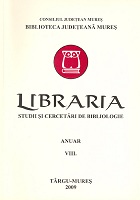Repere antropologice pe harta gândirii filosofice blagiene
Antropological Highlights Considering Blaga’s Philosophical Thinking
Author(s): Liliana MoldovanSubject(s): Anthropology, Recent History (1900 till today), Existentialism, Ontology
Published by: Biblioteca Județeană Mureș
Keywords: Lucian Blaga; Romanian philosophy; human being; mystery; philosophical anthropology;
Summary/Abstract: Romanian philosophy, situated, as it is known, in a plan close to the Western philosophy’s systems of values, has linked its destiny to that of man. Humanism, the faith in the creative capacity of human beings are two constant elements of the Romanian philosophical works. There is a real specific anthropological tradition of the Romanian thinkers who conceived, in time, philosophical works about specific human existential problems. Thus, in the period of the Romanian Humanism, Dimitrie Cantemir showed a first sign of discontent about the metaphysics of the human harmony with the world he belongs to. He launched the idea that the Romanian people was formed within the boundaries of minor cultures. This idea will be adopted and amplified by Lucian Blaga, who expresses dissatisfaction with the human situation created by „minor cultures.” The concern for human problems is quite old in Blaga’s preoccupations. He conceives the relationship between culture and the existential status of man as a means of deepening existential dimensions of the human specific. Blaga considers culture as being a part of the way of existing. Blaga considers that the human being is twice unfortunate. First, because it is subjugated to the desire to overcome the biological condition, then, because it is forced to live in the mystery horizon, in order to reveal it. Blaga's man is perfected in terms of these two unconscious horizons and becomes a mystery itself. Mystery is for Lucian Blaga „the supreme angle of view” that allowed him to understand the world as a mystery. Only by means of mystery, the world can be known and revealed; only through the mystery man can understand and bring the world closer. Blaga writes in Antropologia filosofică that human destiny is twice broken: first, as biological being disadvantaged by poor adaptive capacity; second, as being creative, transcendent subject to the censorship of the Great Anonymous. We do not meet in Lucian Blaga’s works a pure philosophical anthropology. The human type mystery, which he reveals in his philosophical thinking, is decorated with elements related to mythology, folklore, culture and philosophy. Discussions on the problematic nature of the human destiny are specific to European philosophical thought in the second half of last century. Mystery man is just one of the many aspects of the human typology representative for the European culture.
Journal: Libraria. Studii și cercetări de bibliologie
- Issue Year: XVIII/2009
- Issue No: 8
- Page Range: 178-187
- Page Count: 10
- Language: Romanian

